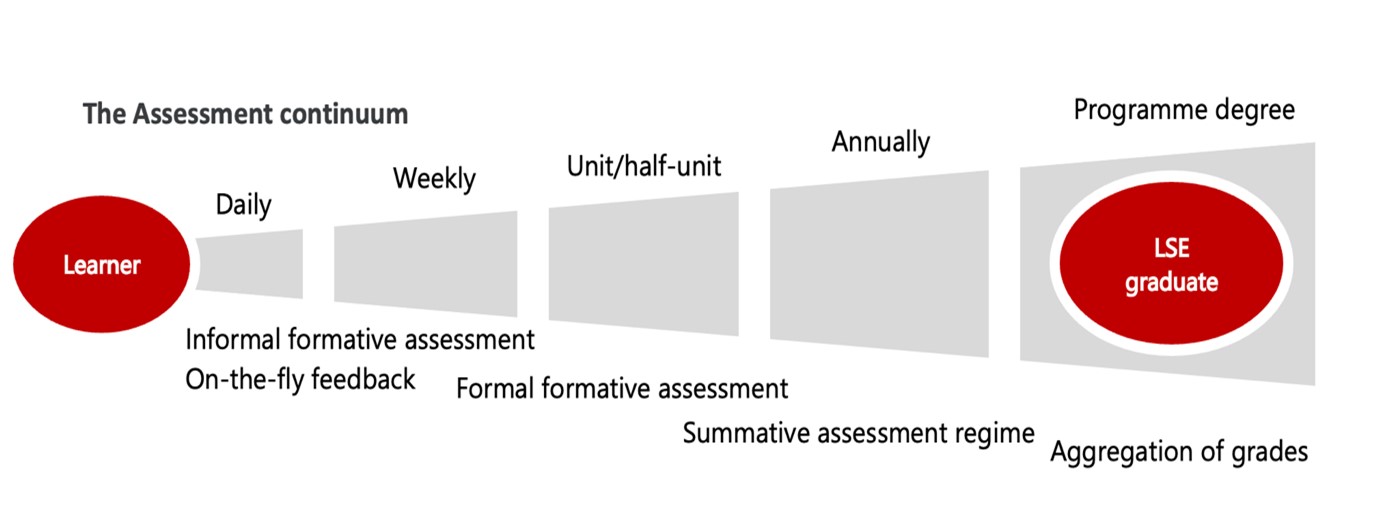Taking a programme-focused approach to assessment helps to ensure students’ intellectual development and skills progression and enables them to see the interconnectedness of their learning across their degree.
Colleagues responsible for student learning at both the programme and course level are encouraged to consider the programme-focused environment and work together to develop assessment and feedback strategies that balance diversity and workload across student pathways.
Key considerations when developing programme-focused assessment strategies include:
- Ensuring that the assessment is aligned to the Programme Learning Outcomes (PLOs). Please see our guidance on PLOs for further information.
- Ensuring a balanced assessment environment, by avoiding assessing one set of skills or knowledge several times and overlooking other skillsets and knowledge.
- Countering assessment overload (cramming too many/multiple assessment points into individual courses).
- Avoiding logjams in assessment deadlines.
- Reviewing the volume and timeliness of feedback.
The LSE Planning Division creates and maintains a range of data visualisations on Tableau Server to support decision making in these areas. You can find further information on these dashboards on the Planning Division website.
A highly developed programme-focused assessment environment allows students to demonstrate their learning in ways that align with their personal and professional journeys. It incorporates a variety of assessment methods such as individual and group projects, presentations and portfolios that allow students to demonstrate their knowledge, skills and competencies in different ways and prepare them for various professional future scenarios. Please see the ‘Designing and re-designing assessments’ section of this Toolkit for further guidance on assessment design.
This visualisation of an assessment continuum demonstrates how assessment is interwoven in the programme of study. It positions assessment as more than an end product of learning, but a stepping stone to further learning.

Figure 1: The assessment continuum
A programme-focused assessment environment influences students’ approach to learning, their sense of a learning community and their experience of continuity over the duration of their degree programme.
Gibbs and Dunbar-Goddet (2007) identified the key aspects that characterise a programme-level assessment environment for students – including the percentage of marks derived from exams; the variety of assessment methods; the volume of formative and summative assessment; the volume of written and oral feedback and its timeliness; the explicitness of goals, criteria and standards; and the extent of alignment of assessment with learning outcomes.
Jessop and Tomas (2016) drew on in-depth data from more than 70 UK degree programmes at 14 institutions using the ‘Transforming the Experience of Students through Assessment’ (TESTA) method. They found (2016: 997):
- That the programme level is relatively hidden from academics’ view: they encounter structural barriers to understanding the balance and range of assessment practice carried out across programmes
- Seeing assessment through the lens of the module does not accurately reflect students’ experience. Disconnection of assessment tasks can lead to them deleting learning from courses they no longer deem relevant and waiting for feedback which may or may not help them to improve the next task.
- Considering programme level data can bring to light these less visible features and support the curriculum design process.
Curriculum assessment mapping
Curriculum-assessment mapping can be effective for establishing a clear team-level understanding of learning and assessment across the entire programme as well as its components, sequencing assessment activities across a programme, ensuring a degree of parity in the volume of assessments across full and half unit courses and organising the timing of the assessments to reduce bunching of student effort.
A possible approach would be to carry out the following stages. Your Eden Departmental Advisers can support you in carrying out this review:
| Step | Activity | Evidence to consider |
|---|
| 1 |
Prepare a comprehensive list of all the assessments (formative and summative) which students currently have to undertake on the programme.
|
-
The percentage of marks derived from examinations.
-
The variety of assessment methods.
-
The volume of summative and formative assessment, that includes:
- the number of pieces of assessment in each assessment mode and method;
- the percentage weighting attached to each assessment task;
- the word / time length for each assessment task.
|
|---|
| 2 |
Revisit the PLOs and question whether they are a valid reflection of the learning on the programme as well as whether the current course combination options enable students to meet these outcomes. This will also enable the programme team to check for gaps, inconsistencies and untapped synergies.
|
-
The explicitness of goals, criteria and standards.
-
The extent of alignment of assessment with learning outcomes.
|
|---|
| 3 |
Identify more complementarities across different courses on the programme and allow members of the programme team to draw more links across courses in their teaching.
|
|
|---|
| 4 |
Create a timeline of assessment deadlines – enabling the programme team to evaluate the spread of assessment throughout the academic year and make changes with a view to ensuring a balanced workload for students in the course of the academic year.
|
|
|---|
The curriculum mapping chart is also available in this Word document.
The self-inventory is an online form created for programme directors and programme team members to review their programme’s assessment environment. Different from curriculum-assessment mapping, this tool focuses on critically evaluating the entire programme assessment environment.
The interactive form of 12 questions is implemented using a Qualtrics survey. It will take up to 20 minutes to complete depending on your familiarity with the whole programme. A summary .pdf of your responses and feedback is available to download at the end. It offers a good starting point to share within the programme team for peer discussion and to inform decision-making. Your Eden Departmental Advisers can support you in carrying out this review.
It can be taken on Qualtrics via this link.
The questions are also available in this Word document.